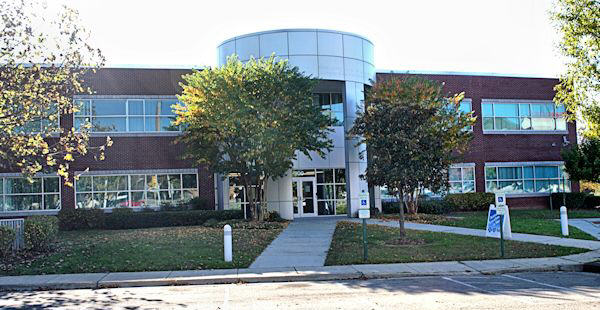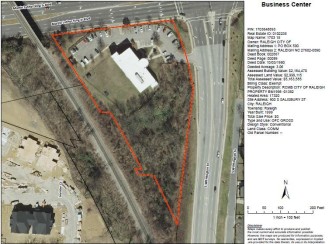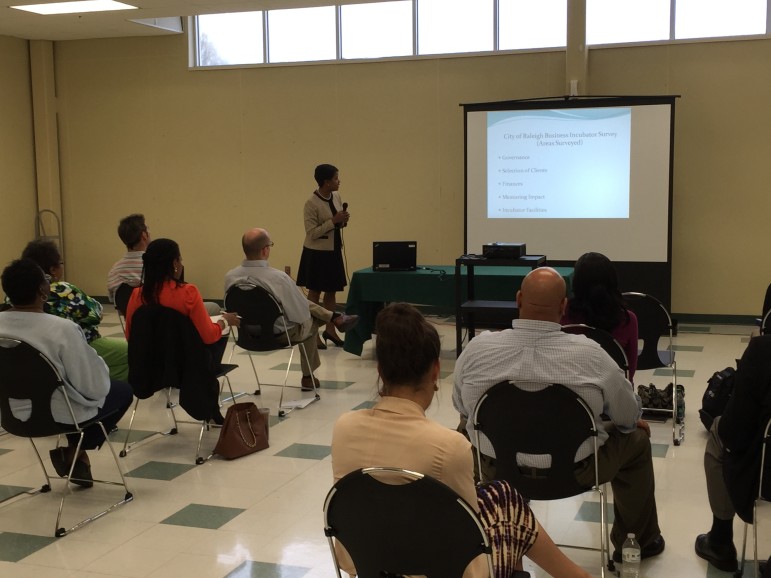The city currently spends more than four times what it takes in from the Raleigh Business Technology Center, an equation it hopes to change by the end of this summer.

City of Raleigh
The Raleigh Business & Technology Center
A 2013 audit of the center by the city turned up issues of fraud and nonpayment, at which point the company running the center was evicted and the city took over management of the facility.
According to a report by Billy Jackson, an employee with Raleigh’s Parks, Recreation and Cultural Resources Department, it costs the city $119,759 a year to run the center. The two largest components of this expense are $29,960 in electric bills and a $35,000 annual salary for the building’s security guard.

An overview of the center from Jackson’s report
The center currently generates $26,568 in annual rent from its five remaining tenants. These tenants, which include Marcus Properties and FYI Technology, pay between $330 and $630 a month for space at the center. According to Jackson’s report, there is a total of 8,545 square feet of rent-able space. The combined square footage of the current five tenants is 820.
Revitalizing the Center
In June of 2014, the city began a visioning process for the future of the RBTC, which included at-times contentious public feedback meetings.
After collecting 136 responses to a survey it issued on the center, the city began making plans to draw up a request for proposals for a new management company to take over the center.
At a meeting in March, city officials said they hoped to advertise the RFP as early as May or June, following a drafting process in April.
 Recent emails obtained by the Record show that the RFP Committee by mid-April had already held two meetings on the proposal’s criteria, and were in regular communication on the direction the center should take.
Recent emails obtained by the Record show that the RFP Committee by mid-April had already held two meetings on the proposal’s criteria, and were in regular communication on the direction the center should take.
An email sent by committee member Daniel Coleman offered a glimpse into the topics covered in some of those meetings. In his email, Coleman indicated that “minority business incubators” had been his “search subject,” and he included a number of articles on the subject as an attachment.
In that email, Coleman also wrote that:
“What I am certain of is our approaching this task with this fixation on the ‘low hanging fruit’ a la property management for the vendors that want to take on this task is blurring the bigger picture “ … The objective of a minority micro-business incubator is support and growth of successful minority micro-businesses resulting in decreased welfare, increased tax base, decreased crime, increased pride of accomplishment …” excerpted from Successful Minority Micro-Business Incubators article hereto attached.”
No direct responses to this email were turned up by the request filed by the Record, although because Mr. Coleman is not a city employee, any emails sent to him by other private citizens on the committee would not have turned up.
City Involvement
While Raleigh’s Chief Technology Officer Gail Roper was initially involved with the revitalization process, an email sent by Roper on April 14 stated that “I have completed my role on this initiative.”
Since that time, assistant city manager Marchell Adams-David has taken over management of the project. Emails indicate that Adams-David has been working with both city staff, such as Economic Development Manager James Sauls, and city council members, such as Mary Ann Baldwin and Eugene Weeks.
At a public meeting in March, Adams-David said the city had elected to utilize an RFP to find a suitable management company because it would allow them to reach a specific solution from potential vendors.

James Borden / Raleigh Public Record
Assistant City Manager Marchell Adams-David discussed the city’s goals for the RBTC in a March public meeting
To help the process remain as fair and open as possible, the city selected an RFP Committee which will not only set the criteria for the proposals, but also assist with the selection process, which will be overseen by the city’s procurement staff.
RFP Committee participants include Tashni Dubroy & Lloyd Williams of Shaw University, Dr. Ron Brown from St. Augustine’s University, Courtney Crowder, a Raleigh resident and entrepreneur, Veronica Alcine, also an entrepreneur and a member of the Central CAC, and Danny Coleman from the South Central CAC and Bo Marshall, a graduate of the center’s former Pacesetter program.
In March, Adams-David said they hoped to have the draft RFP approved by city council no later than May 5. In June, they hope to make a recommendation to the city council for who will run the center.
